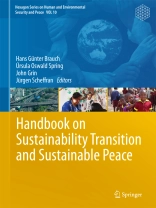In this book 60 authors from many disciplines and from 18 countries on five continents examine in ten parts: Moving towards Sustainability Transition; Aiming at Sustainable Peace; Meeting Challenges of the 21st Century: Demographic Imbalances, Temperature Rise and the Climate–Conflict Nexus; Initiating Research on Global Environmental Change, Limits to Growth, Decoupling of Growth and Resource Needs; Developing Theoretical Approaches on Sustainability and Transitions; Analysing National Debates on Sustainability in North America; Preparing Transitions towards a Sustainable Economy and Society, Production and Consumption and Urbanization; Examining Sustainability Transitions in the Water, Food and Health Sectors from Latin American and European Perspectives; Preparing Sustainability Transitions in the Energy Sector; and Relying on Transnational, International, Regional and National Governance for Strategies and Policies Towards Sustainability Transition.
This book is based on workshops held in Mexico (2012) and in the US (2013), on a winter school at Chulalongkorn University, Thailand (2013), and on commissioned chapters. The workshop in Mexico and the publication were supported by two grants by the German Foundation for Peace Research (DSF). All texts in this book were peer-reviewed by scholars from all parts of the world.
Table of Content
From the Contents: Material and Immaterial Cultural Transformation.- A Social Contract for Sustainability.- The Climate Paradox: Policy Declarations and Lack of Implementation; The G-20: Security & Peace Impacts.- Persistence and Transformation of Mindsets: The Canadian Case.- Theories of Transitions to Sustainable Development: Approach of the Dutch Knowledge network of Systems Innovation.
About the author
Hans Günter Brauch, Adj. Prof. (PD), Free University of Berlin (ret.); chairman of Peace Research and European Security Studies (AFES-PRESS); editor of five English language book series published by Springer Nature; works on peace, security and environment.
Úrsula Oswald Spring, Research Professor, Center for Regional Multidisciplinary Research at the National Autonomous University of Mexico (CRIM–UNAM); former Minister of Ecological Development in the state of Morelos and lead author of the IPCC.
John Grin, Professor of Policy Science, Department of Political Science, University of Amsterdam; Co-Director (with M. Glasius) of the Programme Group Transnational Configura-tions, Conflicts and Governance, Amsterdam Institute for Social Science Research (AISSR).
Jürgen Scheffran, Professor, Institute of Geography and Center for Earth System Research and Sustainability (CEN), Universityof Hamburg, Germany; head of the Re¬search Group Climate Change and Security (CLISEC) in the Cli SAP Cluster of Excellence.












